In Conversation with the Decameron 2.0
Jin Sol Kim, Lulu Liu
Jin Sol Kim and Lulu Liu interview the Decameron 2.0, a Canadian collaborative made up of professors and artists who are inspired by Giovanni Boccaccio’s plague narrative The Decameron (1348-1353) to develop creative works during and in response to the COVID-19 pandemic.
Researching Writing Technologies through the Speculative Prototype Design of Trina
Anne Burdick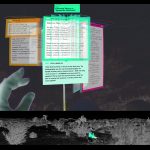
Burdick situates the speculative software prototypes of Trina: A Design Fiction as design-theory hybrids that can expand our understanding of critical making and critical design. The essay offers four readings of the Trina prototypes, designed as research into speculative writing technologies that are situated and embodied. The essay concludes with the introduction of an “Indexical Reader,” a design concept for close and distant reading in the Humanities.
COVID E-LIT: Digital Art from the Pandemic curatorial statement
Scott Rettberg, Søren Bro Pold, Anna Nacher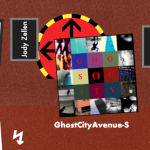
Nacher, Rettberg, and Pold offer a curatorial statement about the COVID E-Lit Exhibition--one of the many exhibitions held at the ELO 2021 conference. This Exhibition in particular, they explain, focused on reactionary, reflexive, and recovery-based art in response to the COVID-19 pandemic.
Pivot! Thoughts on Virtual Conferencing and ELOrlando 2020
Anastasia Salter, Mel Stanfill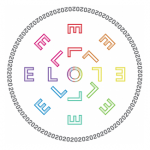
Stanfill and Salter reflect on conferencing amidst their organization of the 2020 ELO Conference in Orlando, Florida that had to change to due a global pandemic. Sharing their experiences and wisdom, they discuss the strengths and weaknesses of various virtual platforms for conferencing, coupled with the contexts of concurrent politics, co-location, and lessons for the future.
Digital Orihon (デジタル折り本): The (un)continuous shape of the novel.
David Thomas Henry Wright
Wright explores the digital manifestation of an orihon manuscript style for how it can expand how we think of the novel's form. He considers how digital versions of J.M. Coetzee's Diary of a Bad Year and his own print novella make use of the concept of the fold as identified in the orihon style.
Why Twining?
Anastasia Salter, Stuart Moulthrop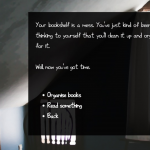
This except from Twining: Critical and Creative Approaches to Hypertext Narratives explores the popular and open-source digital storytelling platform Twine. Authors Anastasia Salter and Stuart Moulthrop discuss the history of Twine as well as existing works and possible projects.
Autopia and The Truelist: Language Combined in Two Computer-Generated Books
Nick Montfort
Nick Montfort discusses two of his computer-generated texts that manifest as print-on-demand books, websites and gallery installations. Though distinct in form and content, Autopia and The Truelist were guided by the author's self-imposed constraints and programmed with minimal code to produce predetermined, "novel-size" outputs. Montfort intends these texts to engage the imaginations of readers with the combinatory aspects of language in culture as well as invite them to a deeper reading of the generating code.
Constructing the Other Half of The Policeman’s Beard
Leah Henrickson
Leah Henrickson explores the contexts surrounding the publication of The Policeman's Beard is Half Constructed, advertised as “the first book ever written by a computer” at the time of its release in 1984. Drawing from contemporary reviews, personal correspondence with the book’s creators, and analysis of the book itself, Henrickson offers insight into precisely how this book was produced, and by whom. Although a computer program called Racter is listed as the author of The Policeman’s Beard, this attribution does not accurately reflect the human labor driving the book’s development and dissemination. This essay illuminates these networks of human labour that ultimately led to Racter and The Policeman's Beard.
Post-Digital Debates and Dialogues from the electronic book review
Scott Rettberg, Lai-Tze Fan, Davin Heckman, Anne Burdick, Joseph Tabbi, Stephanie Strickland, Stuart Moulthrop, Serge Bouchardon, Eric Dean Rasmussen, Lisa Swanstrom
The lively dialogue among the contributing authors, ebr’s longest-serving and newly appointed editors, and the engaged and interested audience, which accompanied the Post-Digital / Dialogues and Debates book launch in September 2020, is an interesting insight into the recent debates on the multifaceted ramifications of digital disruption and the ways in which it has transformed our society, culture, and aesthetics. The discussion throws some light as well on the always fascinating history of the early electronic literature initiatives which had laid the groundwork for what eventually turned out to become the whole new field of intermedia literary practice and the sub-discipline of trans- and interdisciplinary academic inquiry. The authors of the mammoth 2-volume anthology recruit from the variety of contexts and offer diverse looks at the post-digital condition of our contemporaneity.
Reconfiguring Flatness on Screen: A Short History of Cover Designs for Chinese Web Novels
Renren Yang
Renren Yang insightfully reveals the rarely (if ever) explored domain of cover designs for Chinese Web novels. Tracing their evolution from a print format that enables the tactile and sensual pleasures of opening the actual book to its supposedly more immaterial digital incarnation, Yang reimagines the very idea of a book cover in the digital age. This closer look reveals how serialized novels’ cover design frames the reader's experience, demonstrating as well the fact that the already well established periodization of the First, Second, and Third Generation e-literature are culturally and geographically specific, and dependent on the local histories of computing technology beyond Euro-American context. Analyzing the conceptual tension and fusion between book cover as a “mixed medium” and digital cover as “intermedium,” and drawing upon Chinese pictorial tradition, Yang defines the ontology of the digital book cover as an attempt at reconfiguring “flatness” on the digital screen.
“A Snap of the Universe”: Digital Storytelling, in Conversation with Caitlin Fisher
Caitlin Fisher, Lai-Tze Fan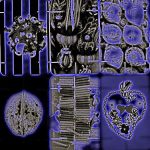
In this conversation with ebr Editor Lai-Tze Fan, internationally acclaimed artist Caitlin Fisher talks through her origins, inspirations, and processes with a clear message: things can always be unlocked with more than one key and stories can always be told with more than one method. Fan asks Fisher about the 20th anniversary of These Waves of Girls at the end of Flash, the archival impulse of her stories from doll collections to hand-held museums, and the importance of creating tiny stories out of high technologies and giant institutional labs. Of the many lives Fisher has already lived and of her works to come, this conversation gives only a glimpse—a snap of the universe.
In Conversation with Bertrand Gervais at the Heart of the Digital World
Dani Spinosa, Bertrand Gervais
Dani Spinosa asks Bertrand Gervais about the place of digital literatures across Francophone and Anglophone Canada, the issue of genre and labelling in the field, and his work with NT2. Gervais here foregrounds the ground-breaking contributions of Québécois writers, artists, and scholars that are foundational to Canadian digital humanities and media studies across the country, and speaks to how important it is that digital publishing prioritize accessibility and evolution.
Literature and its digital and computational others
John Cayley
In this riPOSTe-turned-essay, John Cayley reflects on “the perpetual problem of terminology” in the field of electronic literature.
“the many gods of Mile End”: CanLit Print-Culture Nostalgia and J.R. Carpenter’s Entre Ville
Carl Watts
Carl Watts argues that J.R. Carpenter’s Entre Ville constructs Canadian literature as a unified, holistically understood entity that is both broadly accessible and fleetingly familiar. In so doing, Carpenter’s work aligns representations of Montréal with uses of new media, with the cross-cutting and mutually exclusive identities of the former mirrored in new-media poetry’s partial or conditional embrace of the formal possibilities of digital poetry.
Digital Ganglia and Darren Wershler’s “Nicholphilia”
Sean Braune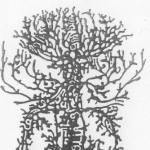
This essay engages with the complex translation of materiality that occurs between Darren Wershler’s NICHOLODEON (1997) and its eventual digital incarnation as NICHOLODEONLINE (1998). Both of these works pay homage to the influential avant-garde Canadian poet, bpNichol. Beyond situating Wershler’s texts in a historical framework that moves from Nichol to the 'Pataphysics of Alfred Jarry, Sean Braune looks at select metadata “clues” that Wershler left behind for the curious-minded reader (human and machine), as well as placing Wershler’s work (and Nichol’s by extension) in the context of theories of language that move from the human to the “tower of programming languages” that are described by Rita Raley and Friedrich Kittler.